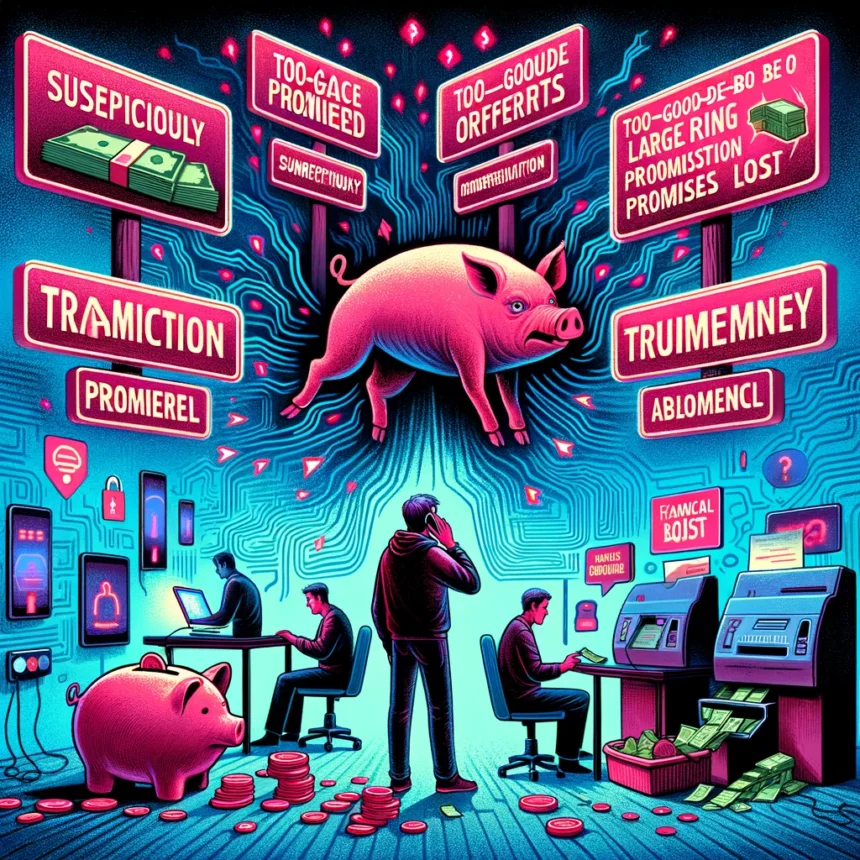As if its own repercussions weren’t awful enough, the pandemic gave birth to a new type of scam costing people money, peace of mind, and even their freedom. The pig butchering scam appeared in 2020 when gambling died down due to lockdowns. It involves getting close to and manipulating victims to lose it all by investing in fake cryptocurrency schemes.
Could you be a victim of pig butchering? Here are the five signs you should look for and what you can do at each stage.
1. Contact from an Unknown Source
Pig butchering scams start in one of two ways. The first involves sending friendly-sounding messages to you by accident. The scammer will apologize for the mistake but then try to establish rapport and eventually trust.
Alternatively, you’ll receive invitations to an investment group, usually dealing with cryptocurrency assets. The moderators and many ordinary members are involved in the scam and create a positive atmosphere that makes the opportunities they present sound legitimate.
The scammers usually send an SMS or reach out through services like WhatsApp. How do they get your number? Usually through data breaches. This rising cyberattack breaches businesses’ defenses and exposes their customer databases. These contain victims’ login information, which hackers and scammers can use to obtain phone numbers if they’re present, along with other account info.
By far, the best way to avoid pig butchering is not to engage with unknown contacts. Block them and move on with your life. Most importantly, you’ll want to protect all your accounts with new strong and complex passwords and activate two-factor authentication so leaked passwords don’t automatically allow access to an account.
2. It’s all about Investing
Too many people don’t heed the above advice and continue interacting with the other person. Some might get lucky and find a genuine friend. Sadly, the majority become targets for the fattening part of the scam.
Pig butchering is a long con that starts by creating trust. The scammers will seem interested in your problems, compliment you, and empower you. Sooner or later, they’ll start talking about their lavish lifestyle or hinting at exciting financial opportunities. A clear red flag is when they keep bringing these up, even if you steer the conversation towards other topics. There’s still time to cut all contact.
3. Promises of Exceptional Profits
Once you express interest, the scammers introduce you to a specific money-making scheme. These are usually fake cryptocurrency brokers yet look like legitimate operations. The crime syndicates that run pig butchering scams have the means and know-how to create legitimate-looking websites and apps. They also manipulate data to show unbelievable returns.
Wanting to make good money quickly and without hassle is a common aspiration these scammers count on. They’ll promise impossible returns like 40%+, reserving them for marks who pay into the highest tiers. If it sounds too good to be true, it likely is. Research the legitimacy of any claims for quick financial gain, especially those from strangers.
4. It’s Going Well at First
Most people are suspicious of unknown investments, even if they swallow the scammers’ hook. That’s why they’ll offer to show you the ropes. Things go well initially – you invest small sums and watch profits reach dopamine-inducing highs.
Then comes the devious part. The scammers allow you to withdraw your winnings. This cements their legitimacy and trustworthiness while making targets eager to invest more. The smart thing would be to walk away with your winnings then and there. However, that’s when they start pressuring you into investing more, usually by exploiting your fear of missing out and creating a sense of urgency.
5. You Can’t Withdraw Your Money
Unsuspecting victims go all in at this point, often investing their life savings or borrowing millions. Estimates put the losses at $75 billion. Unreported damages, not to mention the shame and emotional distress such an ordeal brings, are far greater.
Trouble starts once you try to withdraw large sums since there’s always an obstacle. You might need to pay unforeseen taxes and exorbitant early withdrawal fees. Or, the “trading platform” might experience serious technical issues the customer support team keeps reassuring you will resolve themselves soon.
Either way, they encourage you to wait or even invest more. The damage is done; cutting your losses is the only sensible move left. Some people continue investing until there’s nothing more to give. Disgustingly, recovery scammers may exploit the victim a second time, charging fees to get their stolen assets back but never following through.
Conclusion
Pig butchering scams are hurtful and deplorable on multiple levels. The scammers are often victims of organized crime themselves, trapped and forced to trick other people in hopes of paying off their debts. The best you can do for yourself and these unfortunates is to avoid such scams. We hope this article will help you avoid becoming a victim or break the scammers’ hold over you with as much of your money and dignity intact as possible.




